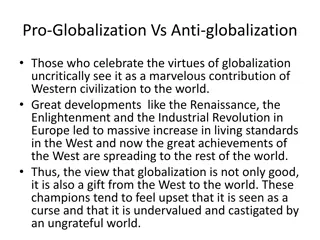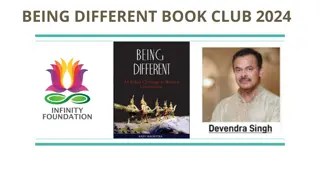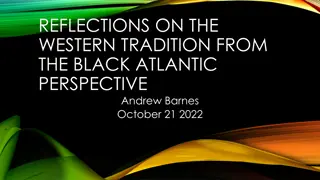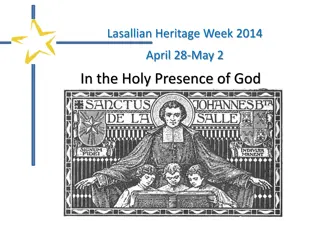Evolution of Western Philosophical Thought: From Idealism to Humanism
Explore the rich history of Western philosophical thought from the idealism of Plato to the humanism of Whitehead. Trace the progression of thought, including materialism, rationalism, skepticism, and relativism, as key thinkers like Descartes, Kant, Marx, and others shaped our understanding of reality and truth.
Download Presentation

Please find below an Image/Link to download the presentation.
The content on the website is provided AS IS for your information and personal use only. It may not be sold, licensed, or shared on other websites without obtaining consent from the author.If you encounter any issues during the download, it is possible that the publisher has removed the file from their server.
You are allowed to download the files provided on this website for personal or commercial use, subject to the condition that they are used lawfully. All files are the property of their respective owners.
The content on the website is provided AS IS for your information and personal use only. It may not be sold, licensed, or shared on other websites without obtaining consent from the author.
E N D
Presentation Transcript
A History of Western Thought Why We Think the Way We Do Summer 2016 Ross Arnold
A History of Western Thought Why We Think the Way We Do Videos of lectures available at: www.litchapala.org under 8-Week Lectures tab
A History of Western Thought Lecture Schedule August 12 Intro/Faith (Plato, Aristotle; Augustine; Aquinas) August 19 Reason (Descartes, Locke, Hume) August 26 Experience (Kant, Schleiermacher) September 2 Process (Hegel, Marx, Darwin, Whitehead) September 9 NO LECTURE September 16 Will (Machiavelli, James, Nietzsche) September 23 Meaning & Meaninglessness (Wittgenstein; Logical Positivists; Derrida) September 30 Where Do We Go From Here?
Progression of Philosophical Thinking ----------------------------------------------------------------------------------------------------------------------------------------------------------------------------------- Idealism We know reality with our minds Plato (c.427-347 BC) Materialism We know reality from our senses Aristotle (c.384-322 BC) St. Augustine (354-430) (faith precedes reason) Thomas Aquinas (1225-1274) (reason precedes faith) Rene Descartes (1596-1650) (rationalism, subjectivism) John Locke (1632-1704) (Empiricism) David Hume (1711-1776) (radical skepticism) Immanuel Kant (1724-1804) (rationalism; subjectivism; relativism) Friedrich Schleiermacher (1768- 1834) (radical subjectivism; relativism) Georg W.F. Hegel(1770-1831) (rationalism; perfectionism) Charles Darwin(1809-1882) (materialism; scientism) Karl Marx(1818-1883) (dialectical materialism) Alfred North Whitehead(1861-1947) (process; relativism)
Progression of Philosophical Thinking ----------------------------------------------------------------------------------------------------------------------------------------------------------------------------------- Subjectivism/Rationalism It s all about me; what I think, experience or prefer; rationality is the only source of truth. Descartes; Kant; Schleiermacher; Hegel Scientism Science and empirical observation are the only sources of truth. Locke; Darwin, Marx Skepticism But how do you KNOW anything? Descartes; Hume Relativism Truth is not absolute, but varies with different experiences. Hume; Kant; Schleiermacher; Whitehead Humanism There is no need for theism or belief in the supernatural; truth must be centered on human agency and science rather than revelation from a supernatural source. Hegel, Darwin, Marx, Whitehead
Niccolo Machiavelli (Italian, 1469-1527) 1st great political philosopher of Renaissance Key thoughts The only concern for political leaders is the will to get and keep political power; moral concerns are unrealistic and unnecessary; the end justifies the means. Long-term impact Machiavelli s political philosophy anticipated political developments of the 20th century, during which leaders were released from moral ideals or belief in absolute values, and the international trend was towards realpolitik the formal governmental policy of retaining power rather than pursuing ideals. This approach justifies deception and violence as political tools, in ways that would be indefensible in private life. (His readers have included Mussolini, Hitler, Lenin and Stalin.)
Here the question arises: is it better to be loved than feared, or vice versa? I don't doubt that every prince would like to be both; but since it is hard to accommodate these qualities, if you have to make a choice, to be feared is much safer than to be loved. For it is a good general rule about men, that they are ungrateful, fickle, liars and deceivers, fearful of danger and greedy for gain. While you serve their welfare, they are all yours, offering their blood, their belongings, their lives, and their children's lives, as we noted above so long as the danger is remote. But when the danger is close at hand, they turn against you. Then, any prince who has relied on their words and has made no other preparations will come to grief; because friendships that are bought at a price, and not with greatness and nobility of soul, may be paid for but they are not acquired, and they cannot be used in time of need. People are less concerned with offending a man who makes himself loved than one who makes himself feared: the reason is that love is a link of obligation which men, because they are rotten, will break any time they think doing so serves their advantage; but fear involves dread of punishment, from which they can never escape Returning to the question of being feared or loved, I conclude that since men love at their own inclination but can be made to fear at the inclination of the prince, a shrewd prince will lay his foundations on what is under his own control, not on what is controlled by others. He should simply take pains not to be hated, as I said.
William James (American, 1842-1910) American psychologist and philosopher who developed the philosophy of pragmatism. Key thoughts Reality is whatever we make it; truth is what works (i.e., achieves desired results); ideas are only meaningful in terms of consequences; if no measurable consequences, there can be no meaning. Long-term impact James Pragmatism rejects the idea of inherent value in anything God, Christianity, religion, morality, etc. If it doesn t work for you, it must not be true. No one belief system is sufficient to explain reality. No absolutes; no single idea of goodness, justice or truth. (Though the fact that belief in God seemed to work for some people was seen as a partly verifiable argument for His existence.) Situational ethics is inevitable. This all effected beliefs about religion, government, psychology, sociology, language, education, cultural criticism, social reform, etc.
Friedrich Nietzsche (German, 1844-1900) Philosopher, poet, skeptic, cynic, madman Key thoughts The will to power; the Superman; God is dead; truth is what you create. Long-term impact Nietzsche said the will to power was the most basic of human drives, over against the slave moralities (such as Christianity) that had lost all power ( God is dead ) and were only encouraged because they serve the purposes of those in authority. The ideal person ( Ubermensch ) would be strong and liberated, creating his own morality that taking control, destroying all gods and freeing creativity. In many ways, he became the spirit of the age for the 20th Century, with his emphasis on power, will, release from traditional values, and survival and success only for the strong.
And Zarathustra spoke thus to the people: I teach you the Superman. Man is something that should be overcome. What have you done to overcome him? All creatures hitherto have created something beyond themselves: and do you want to be the ebb of this great tide, and return to the animals rather than overcome man? What is the ape to men? A laughing-stock or a painful embarrassment. And just so shall man be to the Superman: a laughing-stock or a painful embarrassment. You have made your way from worm to man, and much in you is still worm. Once you were apes, and even now man is more of an ape than any ape. But he who is the wisest among you, he also is only a discord and hybrid of plant and of ghost. But do I bid you become ghosts or plants? Behold, I teach you the Superman. The Superman is the meaning of the earth. Let your will say: The Superman shall be the meaning of the earth! Once blasphemy against God was the greatest blasphemy, but God died, and thereupon these blasphemers died too.
Progression of Philosophical Thinking Idealism -We know reality with Plato (c.427-347 BC) St. Augustine (354-430) (faith precedes reason) Rene Descartes (1596-1650) (rationalism, subjectivism) Immanuel Kant (1724-1804) (rationalism; subjectivism; relativism) Friedrich Schleiermacher (1768-1834) (radical subjectivism; relativism) Materialism -We know reality Aristotle (c.384-322 BC) Thomas Aquinas (1225-1274) (reason precedes faith) John Locke (1632-1704) (Empiricism) David Hume (1711-1776) (radical skepticism) our minds from our senses Georg W.F. Hegel(1770-1831) (dialectical idealism) Charles Darwin(1809-1882) (scientific materialism) Karl Marx(1818-1883) (dialectical materialism) Alfred North Whitehead(1861-1947) (process philosophy) Machiavelli (1469-1527) William James (1842-1910) (will to power) (pragmatism; subjectivism) Friedrich Nietzsche (1844-1900) (will to power; radical pragmatism)
Progression of Philosophical Thinking ----------------------------------------------------------------------------------------------------------------------------------------------------------------------------------- Subjectivism/Rationalism It s all about me; what I think, experience or prefer; rationality is the only source of truth. Descartes; Kant; Schleiermacher; Hegel Scientism Science and empirical observation are the only sources of truth. Locke; Darwin, Marx Skepticism But how do you KNOW anything? Descartes; Hume Relativism Truth is not absolute; it varies with different experiences. Hume; Kant; Schleiermacher; Whitehead Humanism There is no God or supernatural; truth is found in humans and science rather than revelation from a supernatural source. Hegel, Darwin, Marx, Whitehead, James, Nietzesche Pragmatism If it works, it must be right and true; if it feels good... Machiavelli, James Nihilism God is dead; nothing has meaning; strength rules. Nietzsche, (Machiavelli)
A History of Western Thought Why We Think the Way We Do Videos of lectures available at: www.litchapala.org under 8-Week Lectures tab
Progression of Philosophical Thinking ----------------------------------------------------------------------------------------------------------------------------------------------------------------------------------- Idealism--We know reality with Plato (c.427-347 BC) St. Augustine (354-430) (faith precedes reason) Rene Descartes (1596-1650) (rationalism, subjectivism) Immanuel Kant (1724-1804) (rationalism; subjectivism; relativism) Friedrich Schleiermacher (1768-1834) (radical subjectivism; relativism) Materialism--We know reality Aristotle (c.384-322 BC) Thomas Aquinas (1225-1274) (reason precedes faith) John Locke (1632-1704) (Empiricism) David Hume (1711-1776) (radical skepticism) our minds from our senses Georg W.F. Hegel(1770-1831) (dialectical idealism) Charles Darwin(1809-1882) (scientific materialism) Karl Marx(1818-1883) (dialectical materialism) Alfred North Whitehead(1861-1947) (process philosophy) Machaivelli (1469-1527) William James (1842-1910) (will to power) (pragmatism; subjectivism) Friedrich Nietzsche (1844-1900) (will to power; radical pragmatism) Ludwig Wittgenstein (1889-1951) (language is all; rest is nonsense) Jacques Derrida and Deconstructionists (1930- ) (meaninglessness; loss of transcendence) Logical Positivists (early 20th century) (scientific verifiability)























